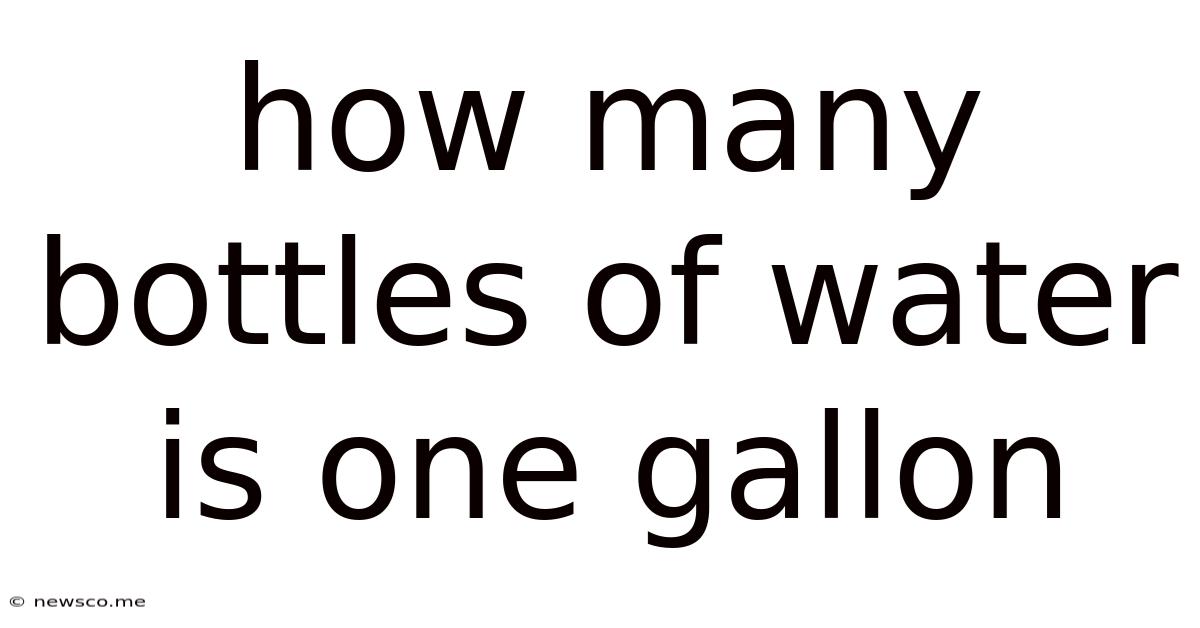How Many Bottles Of Water Is One Gallon
News Co
Apr 21, 2025 · 4 min read

Table of Contents
How Many Bottles of Water is One Gallon? A Comprehensive Guide
Knowing how many bottles of water are in a gallon is surprisingly useful information, whether you're planning a hike, stocking up for an emergency, or simply trying to understand your daily water intake. This comprehensive guide will explore this question in detail, addressing various bottle sizes and offering helpful tips for calculating your water needs.
Understanding Gallons and Fluid Ounces
Before diving into the specifics of bottles, let's clarify the unit of measurement: the gallon. A US gallon contains 128 fluid ounces (fl oz). This is different from the imperial gallon used in some other countries, which holds approximately 160 fl oz. This article will focus on the US gallon unless otherwise specified.
It's crucial to understand that fluid ounces are the key to our calculation. We need to know the volume of water in individual bottles to determine how many fit into a gallon.
Common Bottle Sizes and Their Equivalents
Bottled water comes in a wide variety of sizes. Let's look at some of the most common and calculate their gallon equivalents:
1. Standard 16.9 fl oz Bottles
This is a very common size for single-serving bottled water. To figure out how many fit in a gallon:
- 128 fl oz (1 gallon) / 16.9 fl oz (per bottle) ≈ 7.6 bottles
Therefore, approximately 7.6 standard 16.9 fl oz bottles are equivalent to one gallon of water. You'll need 8 bottles to slightly exceed a gallon.
2. Smaller 12 oz Bottles
These smaller bottles are often found in packs or as individual servings. The calculation is:
- 128 fl oz (1 gallon) / 12 fl oz (per bottle) ≈ 10.7 bottles
Approximately 10.7 smaller 12 oz bottles equal one gallon. You'd need 11 bottles to surpass a gallon.
3. Larger 20 oz Bottles
Larger bottles are becoming more popular, offering a greater volume per bottle. Let's calculate:
- 128 fl oz (1 gallon) / 20 fl oz (per bottle) = 6.4 bottles
You'll need approximately 6.4 larger 20 oz bottles to equal one gallon. Seven bottles will exceed a gallon.
4. Half-Liter Bottles (16.9 fl oz)
Many European countries use half-liter bottles. Since a half-liter is roughly equivalent to 16.9 fluid ounces, the calculation remains the same as the standard 16.9 fl oz bottle: approximately 7.6 bottles.
Factors Affecting the Calculation
The calculations above are approximations. Several factors can slightly alter the number of bottles needed to equal a gallon:
- Bottle variations: Manufacturers may have slight variations in bottle sizes. While the labels generally indicate the volume, there might be minor inconsistencies.
- Filling level: Bottles aren't always filled to the absolute brim. Slight variations in filling levels can affect the overall volume.
- Temperature: The volume of water can change slightly with temperature. Water expands when heated and contracts when cooled. This is usually a negligible effect in daily scenarios.
Practical Applications and Considerations
Understanding the relationship between bottled water and gallons is useful in various situations:
1. Planning Outdoor Activities:
If you're planning a hike or camping trip, knowing how many bottles you need based on your planned water consumption is crucial for staying hydrated.
2. Emergency Preparedness:
Stocking up on emergency water requires accurate calculations. Knowing how many bottles constitute a gallon ensures you have the required water supply.
3. Daily Hydration Goals:
Many health guidelines recommend specific daily water intake. Understanding how many bottles that translates to can help monitor and maintain adequate hydration.
4. Cost Comparison:
Comparing prices between different bottle sizes becomes easier when you can calculate the cost per gallon. This allows you to make informed purchasing decisions.
Beyond Individual Bottles: Bulk Water Purchases
Many people opt for bulk water purchasing methods, such as large water jugs or water dispensers. These offer a more economical and environmentally friendly alternative to numerous individual plastic bottles.
Converting these larger volumes to gallons is relatively straightforward. For example, a 5-gallon water jug clearly contains 5 gallons, eliminating the need for individual bottle calculations.
Environmental Considerations: Reducing Plastic Waste
The sheer number of plastic bottles used globally is a significant environmental concern. Understanding gallon equivalents can help in making conscious choices to reduce plastic waste:
- Reusable Water Bottles: Investing in reusable water bottles reduces reliance on single-use plastic bottles. Knowing how many times you need to refill your reusable bottle to equal a gallon helps in your daily hydration planning.
- Bulk Water Purchases: Purchasing water in larger containers, like 5-gallon jugs, significantly minimizes plastic waste compared to buying numerous single-serving bottles.
Conclusion: A Practical Guide to Water Volume
Understanding how many bottles of water are in a gallon is a valuable skill for everyday life and emergency preparedness. While the exact number varies depending on the bottle size, the calculations and considerations outlined in this guide provide a clear understanding of water volume and its practical applications. Remember to always prioritize informed purchasing decisions and mindful water consumption to reduce environmental impact. By understanding these concepts, you can make well-informed choices about your hydration needs and contribute to environmental sustainability.
Latest Posts
Related Post
Thank you for visiting our website which covers about How Many Bottles Of Water Is One Gallon . We hope the information provided has been useful to you. Feel free to contact us if you have any questions or need further assistance. See you next time and don't miss to bookmark.